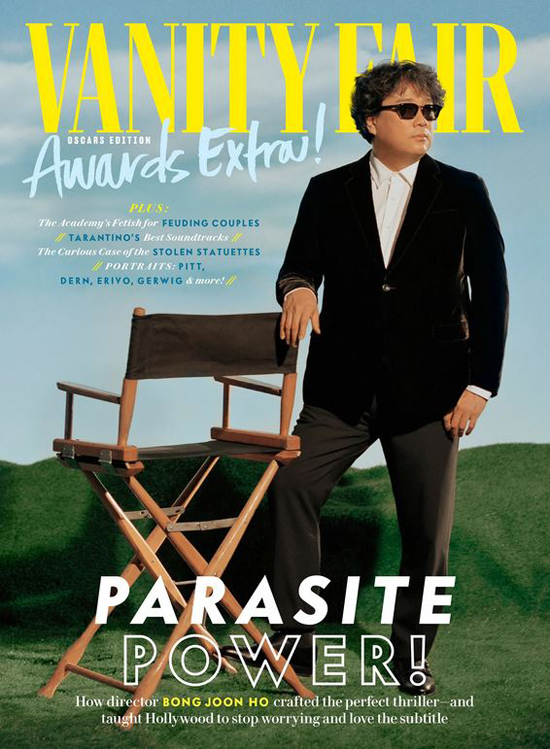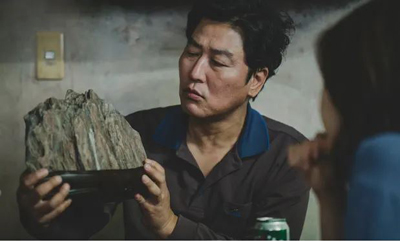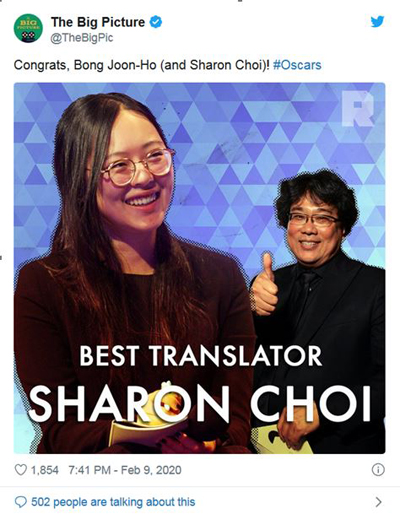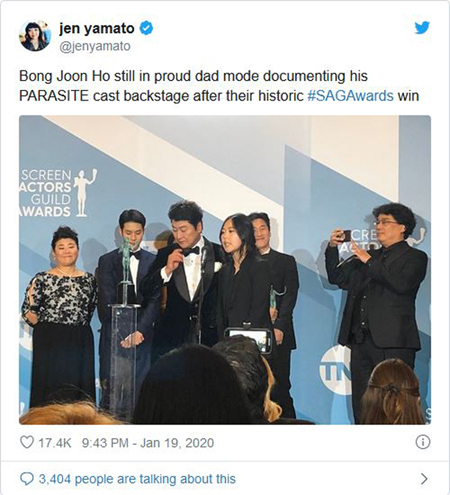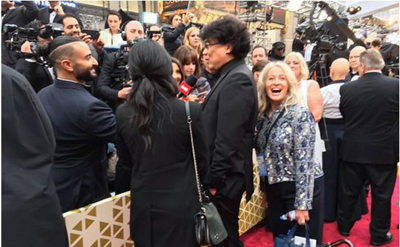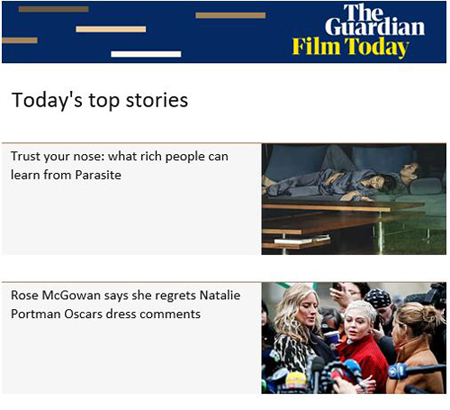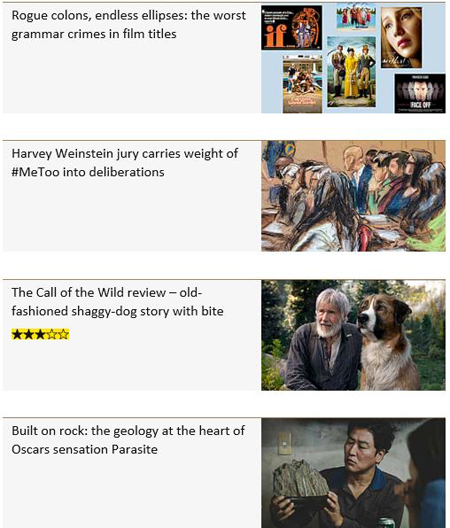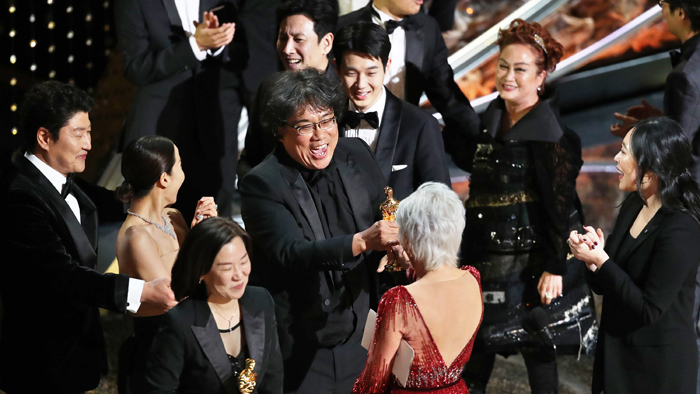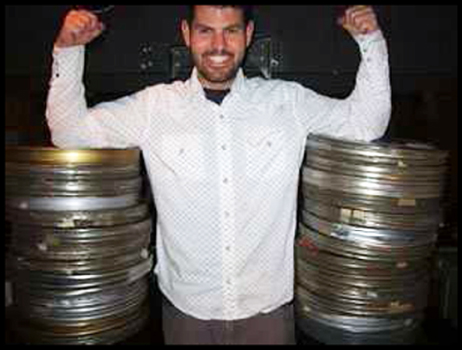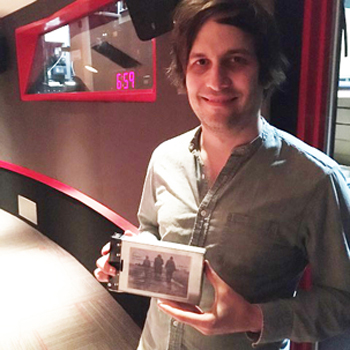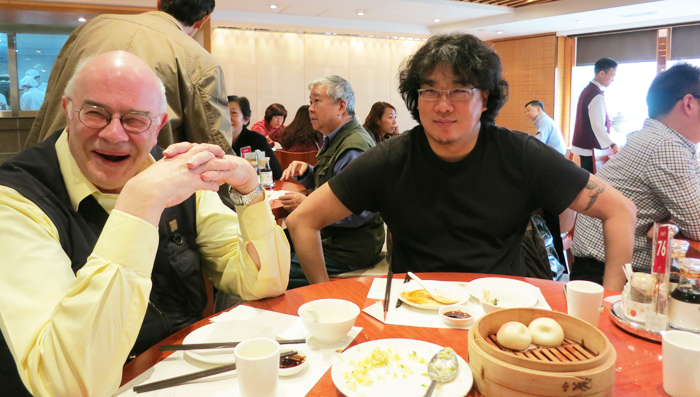Archive for February 2020
PARASITE fever
Kristin here:
It seems like anyone writing for an online or print periodical, whether media-oriented or not, is searching for some sort of hook on which to hang an article about Parasite and Bong Joon Ho. Some of these are a bit of a stretch, others are a bit ephemeral but interesting. All testify to the surprisingly broad interest in a relatively little-known director of the first foreign-language film ever to win the Best Picture Oscar.
Some of this burst of coverage undoubtedly stems from the fact that relatively few people know anything about Bong. Predictably there are many quick overviews of his career to catch people up, as well as plenty of interviews and of where-you-can-stream-Bong’s-films guides.
Here I offer a some links to a fair sampling of some of the less predictable pieces that I have run across. Some are quite bemusing. A few were published before the February 9 Academy Awards ceremony, but the flood has, not surprisingly, come after it.
Such pieces tend to fall into categories.
Items of Mise-en-scene
People are fascinated by the Parks’ gorgeous (at least on the surface) house and yard. Back on October 31, 2019, Architectural Digest, of all places, published an interview with Bong about the set. This is surely one of the most prestigious of non-media outlets to publish on the film. After the Oscars, The Guardian, which has diligently published on various aspects of the film (see bottom), caught up and ran a piece about the set being the “real star” of the film and considering it from a genre point of view.
The mysterious “viewing stone” has been discussed. The Guardian again (see bottom line of bottom image), on February 17, ran a story entitled “Built on rock: the geology at the heart of Oscars sensation ‘Parasite.'”
The Translator
Everybody seems to be enchanted by Sharon Choi, who has accompanied Bong internationally during the long awards season from Cannes to the Oscars. On February 10, Buzzfeed reported, “There’s a Ton of Love and Memes for the interpreter of ‘Parasite’ director Bong Joon Ho.” Sure enough, all over social media there are people gushing about her (above, from the Buzzfeed story).
On February 18, a Variety headline trumpeted, “Bong Joon Ho Interpreter Sharon Choi Relives Historic ‘Parasite’ Awards Season in Her Own Words (EXCLUSIVE).” Choi had, the story reveals, turned down “hundreds of interview requests” before allowing Variety to print her story. In fact, there are interviews with Choi available on the internet, but the Variety story is not an interview. It’s a memoir by Choi in which she recalls the awards season.
Meta
There are articles about the popularity of Parasite and Bong.
On January 20, into awards season but before the Oscars, Morgan Sung posted a piece on Mashable: “Parasite director Bong Joon Ho became a proud dad meme.” On social media, people were posting photos of Bong taking “proud dad” photos of his cast and crew getting awards (above). Note the number of likes and people “talking about this,” plus the presence of Sharon Choi in the group. The Mashable piece presents several more such snips.
Two days after the Oscar nominations were announced, on January 15 Junkee’s Joseph Earp posted about “Bong Joon-Ho, Viral Superstar,” proposing that Bong has become one of those rare directors who becomes a brand in himself. He picks up on Quentin Tarantino’s remark that Bong could become the new Spielberg.
On February 19, the livemint site reported gleefully that the day after the Oscars saw a 857% surge in searches on “Parasite.” This as opposed to 117% for 1917 and 132% for Jojo Rabbit. As the author remarks, “Bong Joon-ho’s tragicomedy thriller has been sweeping all awards and cleaning up at the box office, and people have not been able to stop talking (or searching) on Google.”
And why? “Search for director Bong Joon-ho increased for not only being the mastermind behind the film but also for his quirky sense of humour.”
I suppose the blog entry that you are now reading falls into this category as well. (And then there are our earlier comments.)
Lessons to be learned
On February 10, one of the odder stories I’ve seen went up on CNBC’s “Make It” page entitled: “‘Parasite’ director says his success is due to ‘a very simple lifestyle,’ not meeting a lot of people.” Why a business-oriented website would consider a South Korean film director’s lifestyle relevant to people aspiring to make a lot of money is anyone’s guess. Clearly CNBC was not able to get an interview with Bong so soon after the awards ceremony. Instead, the insights are derived from an article in the British Telegraph (behind a paywall). That piece is also dated February 10, and since it’s a review (albeit a late one), one must presume that its author had interviewed Bong earlier or derived his information from yet another source.
The Guardian (yet again) ran a story on February 18 headlined “Trust your nose: what rich people can learn from Parasite.” This turns out to be a satirical piece, including such tips as not buying a huge coffee table that intruders can hide under without being noticed.
This ‘n’ that
Even a periodical devoted to cuisine found a way to work in a story. On February 10, the day after the awards, Eater Los Angeles ran a story, “Oscar-Winning ‘Parasite’ Cast Parties Until 5 in the Morning at LA Koreatown Restaurant.” We learn, among other things, that “Bong Joon-ho hadn’t eaten anything all day and was so famished that the restaurant cooked up galbi jjim (braised short ribs), eundaegu jorim (braised spicy black cod), galbi (grilled short ribs), bibimbap, and seafood tofu pancakes for him and the cast.”
On February 15, Indiewire‘s Anne Thompson took us “Behind the Scenes of Bong Joon Ho’s Oscar-Winning PR campaign.” Behind the scenes is publicist Mara Buxbaum, seen above with Bong. To Bong’s left is presumably Sharon Choi, who, Thompson tells us, is writing a book about her experiences as Bong’s interpreter.
I suppose the Parasite fever really does result in part from the fact that this is the first time that a foreign-language film has won a best picture Oscar. It’s probably also to a considerable extent the fact that Bong is a charming person, modest, humorous, straightforward, and very talented, and he comes across as such in his acceptance speeches and interviews. People want to know more about him, as is suggested by looper’s February 12 piece on unknown facts about Bong. If they want to know what his favorite films are and maybe watch them, they can read No Film School’s “25 Favorite Films of ‘Parasite’ director Bong Joon Ho” (February 7).
The only people who dislike Parasite and presumably its maker seem to be President T***p and his gormless fans. On February 20, he decried the awarding of the best-picture Oscar to a foreign film:
And the winner is… a movie from South Korea! What the hell was that all that about? We’ve got enough problems with South Korea, with trade. On top of that, they give them the best movie of the year. Was it good? I don’t know. Let’s get Gone With the Wind back, please? Sunset Boulevard. So many great movies.
I shan’t try to unpack the levels of ignorance and misunderstanding jammed into that passage, which was cheered by many who had never heard of Parasite and had no idea what he was going on about. It does make me pause at the notion of T***p watching Sunset Blvd., if indeed he has, and that he seems to think re-released films are eligible for Oscars decades after they were made. I’ve got to believe he at least knows that Gone with the Wind and Sunset Blvd. have already been “gotten back” and are easily available for viewing in numerous formats. The point though, is that even he has a vague notion that Parasite (or, since he doesn’t know the title, “a movie from South Korea”) is good copy.
Two Parasite items on The Guardian’s February 18 film alert.
Awards! and a very long movie
Bong Joon-ho and team accept Oscar. Photo: New York Times.
DB here:
The big news is that Bong Joon-ho has pulled off a coup. Parasite won four major Academy Awards, including Best Picture–a first for a foreign-language title.
Throughout awards season he was his bemused, genial self, and at the big ceremony he charmed everyone with his easygoing generosity toward Scorsese, Tarantino, and others. He went beyond the standard appreciation for the other nominees by saying something too seldom said at this ceremony of superficial self-congratulation: What matters is cinema, from whenever and wherever.
We’ve been supporting Bong’s work since the first days of this blog, and it was thrilling to see his triumph last night. In homage, we’ve posted some earlier encounters with Bong on our Instagram feed.
Just as exciting were the awards given to another FoB (Friend of the Blog), James Mangold. Years ago I wrote about a visit to the studio where Donald Sylvester and his team were preparing sound for 3:10 to Yuma. What a pleasure to see his work acknowledged with an Oscar. I like Ford v. Ferrari a lot, and much of its impact comes from its sound design and its picture editing (which snagged another Oscar last night, this one to Michael McCusker and Andrew Buckland). Congratulations as well to Mr. Mangold, a fine director.
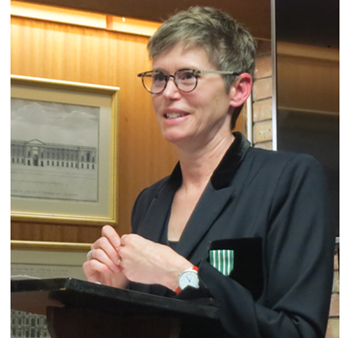 Usually I’m an Oscar cynic, and not just because forgettable pictures too often claim the top honors and masterpieces are ignored. I had many favorites in the race this year, but I’m happy that filmmakers who have worked as hard to make strong, resonant genre pictures got acclaim this time around.
Usually I’m an Oscar cynic, and not just because forgettable pictures too often claim the top honors and masterpieces are ignored. I had many favorites in the race this year, but I’m happy that filmmakers who have worked as hard to make strong, resonant genre pictures got acclaim this time around.
Less crowded but a big deal for us was another ceremony, held last Friday. Then our colleague Kelley Conway, another FoB, received the Chevalier d’Ordre des Arts et des Lettres from the French government. You know, the same award given to Philip Glass, Tina Turner, Cate Blanchett, Ang Lee, Mia Hansen-Löve, Mads Mikkelson, Sylvia Chang, et al. It was a swell get-together, overseen by Dean Susan Zaeske and conducted by Guillaume Lacroix, the French Consul General for the Midwest.
It was a great moment for us and our department. Kelley’s work includes books on the singer in French films of the 1930s, on Agnès Varda, and in progress, a study of French film culture after World War II. She has also guest-blogged for us (here and here and here).
Score another point for Cinema.
Finally, another big event, which took place weekend before last. Our Cinematheque screened Béla Tarr’s legendary Sátántangó. When we showed it last, intrepid projectionist Jared Lewis handled all those reels. This time, no-less-intrepid projectionist Mike King had to massage a DCP.
In that 2006 screening, there were maybe two dozen people. This time, despite freezing cold, there were over 100. And instead of that number dwindling in the course of the day, the audience actually grew. People came in at the middle and they stayed.
See? It’s just cinema being Cinema.
Thanks to our Cinematheque for its excellent programming, and a special thanks to Tony Rayns, who brought Bong to Vancouver many years ago and enabled me to meet him. Tony has been an untiring supporter of young Asian talent, and our sense of modern cinema owes a great deal to his championing directors in their formative years.
For more thoughts on Béla Tarr, go here.
Tony Rayns and Bong Joon-ho, Hong Kong 2014. Photo by DB.












